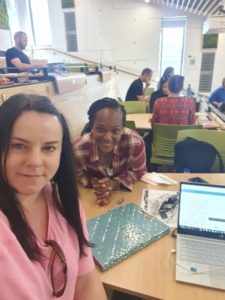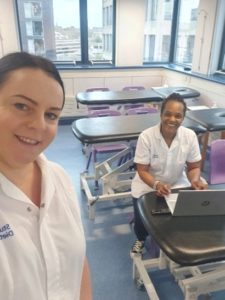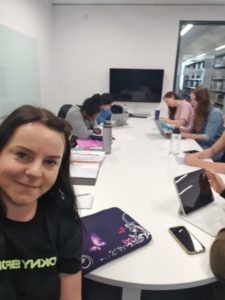
Student Article Series
Cultural Diversity Matters

Healthcare is more than medicine and technology; it is about people, and people are inherently diverse. Effective teamwork is now recognised as essential for building a more effective, patient-centred healthcare delivery system worldwide (1). Allied Health Professionals (AHPs) play an essential role in this system, contributing across various healthcare roles – from dietitians to physiotherapists, radiographers to paramedics, to improve patients’ quality of life from birth to end-of-life. However, many remain unaware of what AHPs do or how to start a career in these rewarding fields.

Diversity of human characteristics includes such as race, ethnicity, gender, gender identity, sexual orientation, age, social class, physical abilities, religious beliefs, and national origin (2). Cultural diversity encompasses the variety of languages, traditions, and beliefs that enrich communities and enhance organisations and institutions (3).
Our ability to reach unity in diversity will be the beauty and the test of our civilization. Mahatma Gandhi
What Inspired you to Study Dietetics?
Dietetics was the perfect combination of my passion for science and my desire to make a positive impact on others. Moving to the UK to pursue a career in dietetics has been one of the most rewarding experiences of my life, opening the doors to personal and professional growth. Growing up in Lithuania, I became interested in nutrition and its impact on our health.
Pros
One of the greatest benefits of studying as an international student has been the significant personal and professional development it has brought into my life. Being part of an academic environment with students from different cultures and backgrounds expanded my perspective and understanding. I developed critical adaptability skills essential in today’s interconnected world. According to Xiaoying et al. (2023), cultural intelligence plays a crucial role in achieving successful academic adaptation (6).
This experience has also highlighted the importance of cultural competence in healthcare, which provides for each patient’s unique needs. Coming from a diverse background, I bring unique skills, perspectives, and ideas my culture shapes. Respecting cultural norms leads to better adherence to treatment plans. Research indicates that patients value healthcare approaches sensitive to cultural diversity, leading to improved outcomes (7).
Healthcare providers are increasingly caring for patients from diverse cultural / or ethnic minority backgrounds due to ongoing globalisation and migration waves. The language barrier often limits effective communication in healthcare in the UK, where ethnic and cultural diversity is common (3). Since I speak multiple languages, I can cover these gaps by supporting patients who share my cultural background or speak the same language, making sure they feel heard and respected.

Cons
However, the journey has not been without its challenges. It took a while to adjust to a new academic and healthcare environment including adapting to cultural differences, overcoming language barriers, and challenges in communication skills. Additionally, being away from my family has been one of the hardest parts of this journey, leaving me to face the challenges on my own and find a new friends and connections and build a sense of belonging in a place far from home.
According to Masood Zangeneh etc. (2019) report indicates that immigrants are greater physical and behavioural health, despite having to face many challenges such as racial discrimination, language barriers, occupational disappointment, social isolation (4). Research suggests that immigrants demonstrate a remarkable pattern of strengths for their remarkable resilience and resourcefulness and adapting to cultural and social environments and maintaining positive outcomes in education, work and well-being (5).
For me, these challenges have a good side, they have also been incredibly rewarding. I learned that embracing diversity: be it in language, culture, or perspectives, makes us stronger as professionals and as individuals.
My voice matters, my perspective is valuable, and my background is an asset rather than a barrier
My Experience in the AHP Leadership Placement
During my three-week leadership placement at the AHP Faculty, I gained a good understanding of the role of Allied Health Professionals in patient care. Attending webinars and face-to-face leadership training days alongside amazingly friendly and supportive leadership professionals was an invaluable experience. Their encouragement and commitment to inclusion and collaboration expanded my perspectives and allowed me to grow personally and professionally.
Thanks to this experience, I gained a strong of self-confidence. Surrounded by professionals, I realised that my voice matters, my perspective is valuable, and my background is an asset rather than a barrier. Their encouragement gave me the confidence to grow, contribute, and see myself as a future leader in my field. This experience perfectly demonstrates the Aspiring Allies campaign’s aim to encourage a diverse and inclusive Allied Health Profession workforce that welcomes people from all backgrounds, cultures, and experiences to build an inclusive AHP workforce that reflects the diverse needs of society. They are building a healthcare environment where diversity is welcomed and authentically valued.

Encouraging Future AHPs
To anyone thinking about a career in the Allies Health Professions, your voice, background, and experience are not just welcomed; they are needed. Believe in yourself, welcome every opportunity, and know that diversity makes healthcare stronger and truly inclusive.
If you are unsure where to begin, visit useful links available through Aspiring Allies, which include inspiring stories, career guidance on virtual learning programs, or finding your future by taking a quiz or reading informative articles. Remember that “Cultural competence is a going process of learning and self-awareness, not a fixed skillset” (9). With every step you take, you will be helping to shape a healthcare system that values inclusion and equality.
To bring my journey and the message of Aspiring Allies to life. I have created a short video to inspire and encourage others to consider an AHP career.
Reference
1. Babiker, A., Husseini, M.E., Nemri, A.A., Frayh, A.A., Juryyan, N.A., Faki, M.O., Assiri, A., Saadi, M.A., Shaikh, F. and Zamil, F.A. (2014). Health Care Professional development: Working as a Team to Improve Patient Care. Sudanese Journal of Paediatrics, 14(2), p.9.
2. Ferris State University (2022). Diversity and Inclusion Definitions – Ferris State University. [Online] www.ferris.edu. Available at: https://www.ferris.edu/administration/president/DiversityOffice/Definitions.htm.
3. Schouten, B.C., Cox, A., Duran, G., Kerremans, K., Banning, L.K., Lahdidioui, A., Muijsenbergh, M. van den , Schinkel, S., Sungur, H., Suurmond, J., Zendedel, R. and Krystallidou, D. (2020). Mitigating language and cultural barriers in healthcare communication: Toward a holistic approach. Patient Education and Counseling, [Online] 103(12), pp.2604–2608. Available from:https://www.sciencedirect.com/science/article/abs/pii/S0738399120302421
4. Masood Zangeneh, Alean Al-Krenawi and Springerlink (2019) Culture, Diversity and Mental Health – Enhancing Clinical Practice. Cham: Springer International Publishing.
5. American Psychological Association Presidential Task Force on Immigration. (2013) Crossroads: The psychology of immigration in the new century. Available from:https://www.apa.org/topics/immigration-refugees/executive-summary.pdf
6. Xiaoying, H., Baharom, S. and Sunjing, L. (2023). A systematic literature review of the relationship between cultural intelligence and academic adaptation of international students. Social Sciences & Humanities Open, [online] 8(1), p.100622. Available from:https://www.sciencedirect.com/science/article/pii/S2590291123002279
7. Saha, S., Beach, M.C. and Cooper, L.A. (2020). Patient Centeredness, Cultural Competence and Healthcare Quality. Journal of the National Medical Association, [online] 100(11), pp.1275–1285. Available from:https://pmc.ncbi.nlm.nih.gov/articles/PMC2824588/
8. Martin, M.L., Heron, S., Moreno-Walton, L., Strickland, M. and Springerlink (Online Service (2019). Diversity and Inclusion in Quality Patient Care: Your Story/Our Story – A Case-Based Compendium. Cham: Springer International Publishing.




